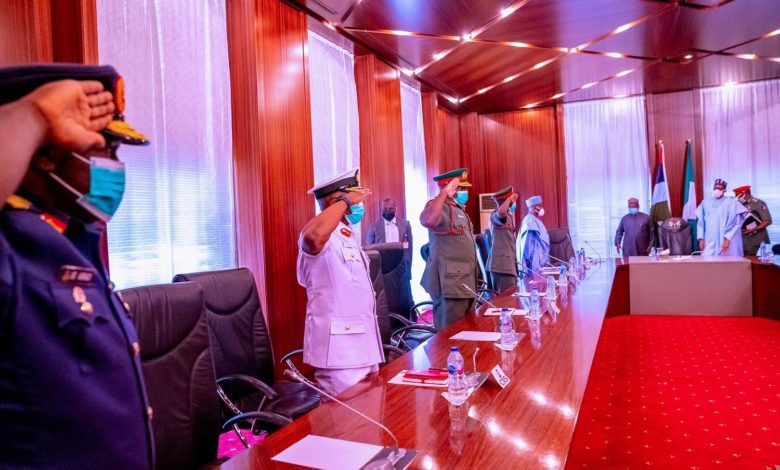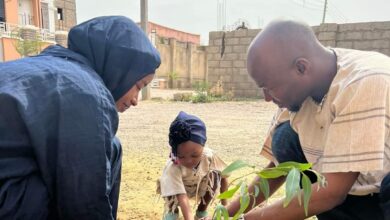Nigeria’s National Security Establishment Has A Patriarchal Problem
The Nigerian national security management’s deeply male-dominated nature impacts the design and implementation of security policies.

Nigeria’s security sector is deeply patriarchal as evident in the lack of women representation at the top of the national security structure.
This is despite the impact of insecurity and security policies on women and girls across the country.
On March 2, President Muhammadu Buhari presided over a male-dominated National Security Council (NSC) meeting at the state house. This meeting took place just a few days before International Women’s Day which is observed on March 8, annually.
HumAngle understands that the absence of women representation at the NSC, a forum saddled with the responsibility of advising the President on matters of national and public security, creates an environment that could be difficult to effectively integrate gender perspectives in security policies and actions.
Kolo Kenneth Kadiri, a social behaviour change communications specialist told HumAngle that even at grassroots level, our security architecture does not incorporate women, though they bear the biggest brunt of insecurity and violent conflict.
The NSC comprises the President, Vice-President, Secretary to the Government of the Federation, Chief of Staff, National Security Adviser, Attorney General, and Ministers of Internal Affairs, Defence and Foreign Affairs.
Other members include the Chiefs of Defence Staff, Army, Navy and Air Force, Inspector General Of Police, and Director-Generals of the National Intelligence Agency (NIA) and State Security Services (SSS).
The 2021 International Women’s Day served as an opportunity to highlight the obstacles to gender equality and women’s inclusion in various aspects of governance, including the management of security.
Kadiri told HumAngle that a nation without active female representation in its security architecture, will continue to suffer men’s action and inaction, borne by women and children.
“How do you provide security to an all girls’ school? How do you carry out disaster risk reduction factoring women, when there is no woman on the NSC to provide needed perspectives?”
The empowerment and participation of women are important for stability as they make up almost half the population of the country. In 2015, Nigeria’s population was projected at 183 million people, of which 91 million were female and 92.4 million were male.
The composition of the security council reflects the general patriarchal tilt of the public sector and possibly explains the government’s obsession with forceful, kinetic measures in addressing security challenges ravaging parts of the country.
Improving women participation in security and peace
The United Nations Security Council Resolution 1325 on women, peace, and security adopted on Oct. 13, 2000, highlights the unique impact of armed conflict on women and girls.
The resolution also creates awareness of the need for gender equality in security processes, participation, prevention, protection, resolution, and recovery.
Improving the participation of women in the security sector and peacebuilding requires deliberate efforts to provide an enabling environment for women representatives at the top to serve as mentors to more women and girls, and ensure national security policies are both gender-sensitive and responsive.
In 2019, the Nigerian Air Force winged its first female fighter pilot, Flying Officer Kafayat Sanni, and the first female combat helicopter pilot, late Flying Officer Tolulope Arotile. This accomplishment, despite being late, has paved the way for more female combat pilots and increased the possibility of a future female Chief of Air Staff.
Deterring sexual and gender-based violence against women is understood to be an essential component of a healthy environment for women in the various paramilitary, military and police services.
Other elements include respectful treatment of women, and addressing misogyny in training.
A recent report by Elizabeth Pearson, an expert on gender and extremism, and Chitra Nagarajan, an activist and researcher, highlighted the gendered harms wreaked by state policy and the counterinsurgency campaign against Boko Haram.
The report suggested that “a simplistic approach to ‘women’, rather than gendered power relations, leaves Nigeria ill-equipped to respond to the complex gendered dynamics of jihadist actors in the Northeast.”
It also reviewed policies like the National Action Plan on Women, Peace and Security and National Action Plan for Preventing and Countering Violent Extremism and concluded that despite increased attention on women, peace and security, Nigeria is still failing to protect women.
Similarly, a study by Titilope Ajayi, a gender and security expert showed that safety and security are of prime concern for women and girls.
“Both before and during displacement, they routinely face sexual and gender-based violence from Boko Haram, as well as camp officials and security actors,” the report said.
Support Our Journalism
There are millions of ordinary people affected by conflict in Africa whose stories are missing in the mainstream media. HumAngle is determined to tell those challenging and under-reported stories, hoping that the people impacted by these conflicts will find the safety and security they deserve.
To ensure that we continue to provide public service coverage, we have a small favour to ask you. We want you to be part of our journalistic endeavour by contributing a token to us.
Your donation will further promote a robust, free, and independent media.
Donate Here




